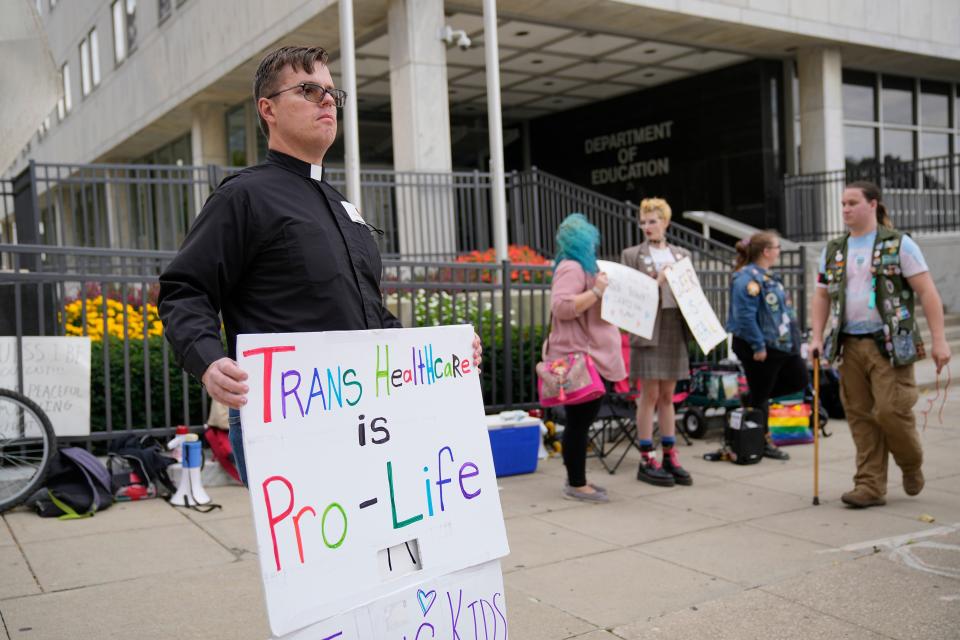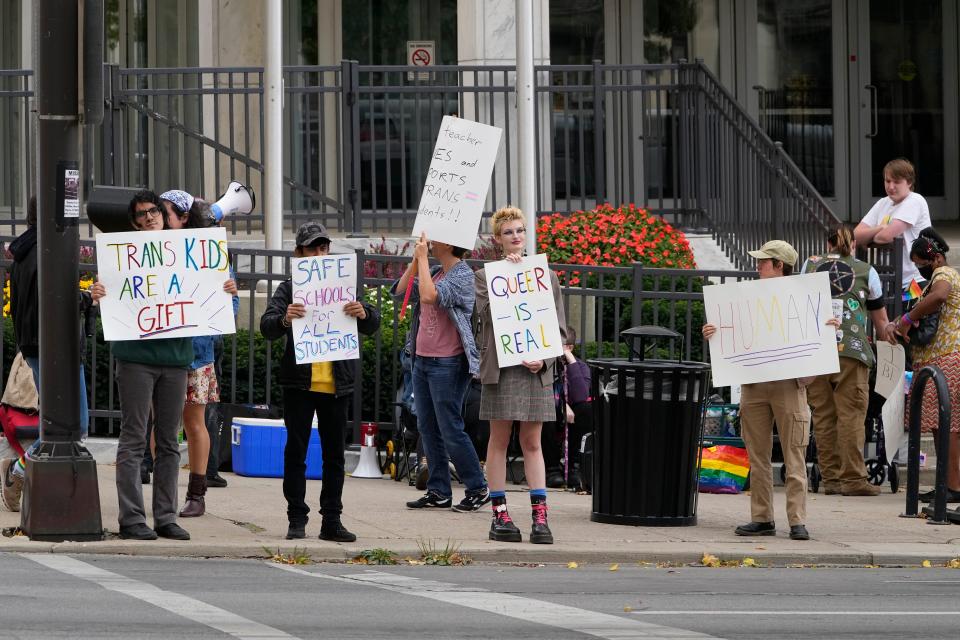Gender-affirming health care focus of Ohio governor's veto: what to know about issue
- Oops!Something went wrong.Please try again later.
Ohio Gov. Mike DeWine vetoed legislation Thursday that would have restricted health care for transgender minors and banned transgender girls from playing on girls sports teams.
House Bill 68 cleared both state chambers earlier in December and would have prevented doctors from prescribing hormones, puberty blockers or gender-affirming surgery before patients turn 18 years old.
The American Medical Association has stated its support for gender-affirming care for minors in the past, citing evidence that suggests prohibiting such medical care can have severe physical and mental consequences on the patient.
“Were I to sign House Bill 68, or were House Bill 68 to become law, Ohio would be saying that the state, that the government knows better what is medically best for a child than the two people who love that child the most: their parents," DeWine said.
As Republican state leaders across the country have ramped up anti-LGBTQ rhetoric and legislation in the last three years, DeWine's veto sends a bold political message, said Imara Jones, a transgender activist and founder of TransLash Media.
"The Republican party has defined itself as an anti-trans party, and for him to essentially decide that his party was wrong on this issue is a huge deal," she told USA TODAY.
HB68 bill passed with a supermajority, meaning it could have enough support to override DeWine's veto. Here is what to know about gender-affirming health care:
More: Utah becomes first state in 2023 to ban gender-affirming care for transgender minors
What is gender-affirming health care?
Gender-affirming health care includes everything from talk therapy to hormone therapy to (in rare instances) surgical intervention. Keep in mind that transgender adults make up less than 2% of the U.S. population; about 5% of young adults identify as transgender or nonbinary.
"For most kids, gender-affirming care is literally just affirming their identity," Jones said. "It has nothing to do with the medical establishment."
Hormone therapy for minors can include puberty blockers, which experts say are reversible and prevent children who have already socially transitioned from going through irreversible body changes brought on by puberty.
DeWine said this week he wants state lawmakers to draft a new version of the bill that bans gender-affirming surgeries for minors.
Gender-affirming health care is not a one-size-fits-all method and only medical doctors provide this type of care. Barriers to accessing care, like lacking health insurance, can also prevent people from getting procedures or therapies.
Experts also say that almost no transgender young people receive surgery until they are in their later teens and on the verge of adulthood. Often, gender-affirming care for young people involved affirming that person's social transition: using a different name or pronouns, picking out different clothes or styling hair differently.
"All of the bills that focus on gender-affirming care for youth are a solution in search of a problem," Jones said. "For the vast majority of young people who identify as trans, the most involved medical interventions that people think about are not available to them," she said, explaining how young people, their parents, doctors, and a therapist have to agree on the health care a child receives.
'But most of all I'm human': These 3 transgender teens prove identity stretches beyond one label

What is gender-affirming surgery?
Like all gender-affirming health care, surgeries, and whether or not to get one, are highly personal decisions.
There are several types of surgical procedures someone can receive, called "gender affirming surgeries" by the American Society of Plastic Surgeons.
"The goal is to give transgender individuals the physical appearance and functional abilities of the gender they know themselves to be," according to the ASPS website.
The procedures are commonly known as "top," or "bottom" surgeries, referring to their location on the body. There are also facial procedures that can be considered "gender-affirming."
ASPS defines these procedures as the following:
Facial feminization or masculinization surgeries - changing facial features to reduce or extenuate more feminine or masculine features.
Top surgery - altering the chest to relieve gender dysphoria by reducing or augmenting curves or breasts
Bottom surgery - altering sex characteristics and genitalia to relieve gender dysphoria
"This is life-saving care. The evidence shows that when people get this care, they live longer, better, happier, more fulfilled lives, period," Jones said. "That's why gender-affirming care is medical consensus, it is the consensus of the medical community that this care is life-saving and important."
More: 'Being transgender is not a medical condition': The meaning of trans broken arm syndrome

How does access to gender-affirming care impact youth?
The Endocrine Society of medical professionals studying hormones praised DeWine's move. A press release from the organization shared with USA TODAY Friday said the bill would have contradicted scientific evidence and and mainstream medical practice.
"Pediatric gender-affirming care is designed to take a conservative approach," the release states. "When young children experience feelings that their gender identity does not match the sex recorded at birth, the first course of action is to support the child in exploring their gender identity and to provide mental health support, as needed."
Those under age 18 who received gender-affirming hormone therapy were linked with 40% lower odds of recent depression and a past-year suicide attempt, according to research from The Trevor Project.
The organization found this year that 45% of LGBTQ youth seriously considered attempting suicide within the last year.
Legislation aiming to block access to gender-affirming care for minors has put further strains on LGBTQ youth. Around 85% of trans and nonbinary youths say recent debates about state laws restricting their rights have negatively impacted their mental health, according to another poll by the The Trevor Project.
What's next for gender affirming care in Ohio?
Access to gender-affirming health care only affects the lives of transgender children and their parents, said Jack Drescher, a clinical psychology professor at Columbia University who focuses on sexuality and gender identity. Decisions about care are private and only made by families and medical professionals who treat them, he said.
“People don’t think the government should get in the middle of that,” Dresher told USA TODAY.
The right health care leads to transgender patients feeling less depressed and anxious and “feeling more like themselves,” Drescher said.
Drescher said he fears Ohio Republicans, who have a supermajority in the state's legislature, will vote to overturn the governor’s veto, an executive check he praised in an interview.
“It’s good that he did it, it’s reassuring sometimes to see there are some reasonable people in positions of power in government. Unfortunately, they may not be in the Ohio legislature,” he said.
More: Lawmakers, groups react to Gov. DeWine's veto of HB 68 transgender medical care bill
Contributing: Susan Miller, USA TODAY; Haley BeMiller, Jordan Laird, Columbus Dispatch
This article originally appeared on USA TODAY: Gender affirming health care, surgery focus of Ohio governor's veto

